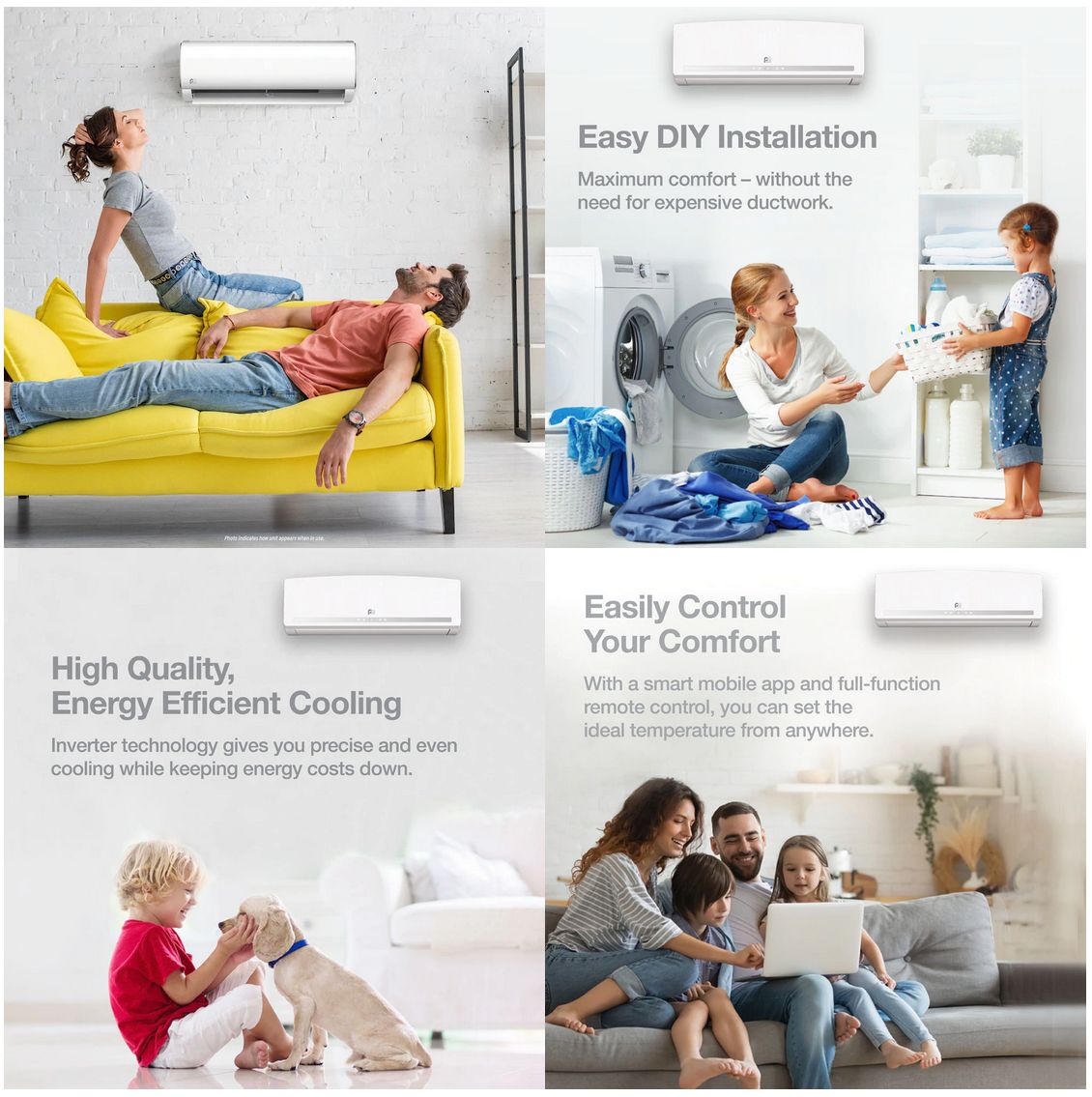Should I Repair or Replace My Air Conditioner?
Should I Repair or Replace My Air Conditioner?
Reprinted with permission from Mr Cool
During the summer months you might be wondering how you’re going to keep your house at a comfortable temperature during the grueling hot season. Get yourself a high-quality AC replacement to regulate the airflow of your home so that you can focus on what’s important, like whether you should serve hamburgers or hot dogs at your backyard party.
When the temperature is hot outside, you need a reliable, energy-efficient AC system. If your HVAC unit hasn’t been doing its best over the years, you might have to get it inspected to figure out the problem. You can repair some of the faulty parts if the unit is relatively new, but you could save money over time with a full AC replacement. Use this guide to help you decide whether you should replace or repair your air conditioner.
How Do I Know If I Need to Replace My Air Conditioner?
Even though a new AC unit may cost more than you’re willing to spend, an older, less efficient air conditioner could be costing you even more money. You could have a brand-new, affordable, energy-efficient HVAC system from Ronusa.com if you decide you need to replace it. Here are some signs that it’s probably time to invest in an AC replacement before your system shuts down completely when you need it the most.
1. Replace Your Unit If It’s 12-15 Years Old
The average lifespan of a central air conditioner is about 15 to 20 years. While you could make it last longer by replacing certain parts, if you haven’t maintained it properly, you might start seeing signs of wear and tear even earlier than 15 years. Instead, start over and get a brand-new air conditioning system so that you can have these benefits for your home:
»Energy efficiency: A new AC system will provide a better seasonal energy efficiency ratio (SEER). Most older systems only offer a SEER rating of 6 or less, but modern units have rates at least double that number. When you have more energy-efficiency, you can save money on your energy bills over time.
»Reliability: With an old unit, you never know if it’s going to stop working on you one day. If you decide you want to replace your air conditioning unit, you know where and when it was manufactured, so you know it will last for years to come.
»Safety: Several decades ago, the refrigerant in HVAC units contained Freon, which is toxic and depletes the ozone layer. A newer AC system won’t include these poisonous chemicals, so you can breathe safely and know that you’re saving the planet.
2. Replace Your Unit If It Has High Repair Costs
Consider how much it costs you to fix your HVAC system each year and compare it to an HVAC replacement cost. The HVAC technician only needs to pay you a visit about twice a year, maybe a little bit more if you have an older unit. If you need to call them more like once a month, you might need an air conditioner replacement. Here are some questions you should ask yourself:
»How much money do I spend on air conditioner repairs? Think back over the last couple of months and consider how many times you had to call an HVAC technician. Instead of dishing out all that cash, you can get a brand-new HVAC unit with a warranty. The cost of an HVAC replacement will practically pay for itself with all the money you’ll be saving in maintenance.
»What’s your cutoff point for the home AC repair cost? If your AC system is getting up there in age, think about how much you’re willing to spend on air conditioner repairs. Once you spend over that threshold, start shopping for a brand-new air conditioning system.
3. Replace Your Unit If It Has Consistent Breakage
Your air conditioner may have a habit of breaking down more often than you’d like. As a result, your wallet is empty, and you’re sweating in the middle of July. Every time you call the HVAC technician to come to repair your air conditioning system, you have to pay them money on top of what it costs to repair the machine.
While constant repairs are annoying, they are also dangerous. If your HVAC unit has a refrigerant leak and spills pools of liquid onto the floor, it can be a hazard to your health. Any excess liquid, even water, could result in mold and mildew build up over time. To have a peace of mind about your property, replace your older machine with a more reliable one.
4. Replace Your Unit If Its Energy Bills Are Rising
On average, heating and cooling makes up 48% of your home’s overall energy expenditure. When you upgrade to an energy-efficient HVAC system, you can save real money on your energy bill each month. Keep your eye out for the ENERGY STAR® label on your unit to determine its energy efficiency. Look for these signs that your AC isn’t efficient anymore:
»Broken or clogged vents: If your AC is cranking out air, you could have a problem with the vents. While an HVAC technician can replace or clean them, your air conditioner has had to work harder to regulate the temperature of your home. You might have to get a new HVAC unit if your vents were clogged for a long time.
»Constantly blowing out air: A common problem with older HVAC systems is when the system continuously blows out air. Either the thermostat isn’t working correctly or you have a problem with your fan relay mechanism. You may also have inadequate insulation that is causing hot air to sneak into your house. Either way, the more energy your AC unit spends, the more money you’ll see on your energy bill.
»Paying too much money: Your AC probably lost its energy efficiency if you’re suddenly paying a lot more on your energy bill. If you switch to an energy-efficient air conditioner, which is about 15% more efficient than standard air conditioning systems, you might be eligible for a tax incentive. When you purchase one of our high performance MRCOOL HVAC units, you could be eligible for local energy efficiency rebates and incentives.
5. Replace Your Unit If It Can’t Perform to Your Satisfaction
Your air conditioner’s job is to make you feel comfortable in your own home. Instead of sweating all summer, invest in a brand-new AC system. Here are some signs that the quality of your AC has declined:
»It doesn’t work: There’s something wrong with your AC if it’s not producing cold air. Whether it’s blowing out hot air or it’s not working at all, you will need to replace it so you can enjoy your house this summer.
»You have uneven temperatures in each room: An air conditioner cools and dehumidifies the air in your whole house. If one place is warmer or more humid than another, you should consider replacing your HVAC unit.
»Doesn’t accommodate the size and layout of the room: Air conditioners that are too small will run inefficiently, cycling on and off too much. They’ll make your living space stuffy and uncomfortable if they don’t run long enough to get rid of the humidity in the air. If you have recently redesigned an area of your house, call in an HVAC technician to make sure your AC system fits in the new layout.
Can’t I Just Repair Some Broken Parts of My Air Conditioner?
Before you run out and buy a new air conditioner for your property, consider repairing your HVAC. Sometimes repairs might be the better option. If you have a working air conditioning unit that isn’t costing you hundreds of dollars each month, a simple tune-up might be enough. The AC system might have a couple of problems here and there, but you can repair the faulty parts instead of replacing the whole thing.
Keep in mind that if you ever have to switch out a part of your air conditioner, the replacement needs to be the same make and model. Contact the manufacturer for the proper part so your machine can function correctly. Think about these reasons for repairing your air conditioning unit so you can choose what to do next.
1. Repair Your Unit If It’s Under 10 Years Old
If you invested money in a brand-new AC a couple of years ago, an air conditioner repair would make the most sense instead of replacing the whole system. The unit may even be under warranty if you bought it recently. Check with the AC system’s manufacturer to find out if you can get a part replaced for free.
You should also hold off on replacing your air conditioner if you’re thinking of selling your house soon. Whether you have to relocate or you plan on living in your home forever, put some thought into the investment an HVAC system would bring to your house. Your real estate agent can tell you how replacing the AC unit will affect the resale value of your house.
2. Repair Your Unit If It Has Low Repair Costs
The main reason to consider replacing your air conditioner is to save money. As you think about the average cost to replace heating and air conditioning systems, if the amount you pay in an AC repair doesn’t cost that much, you could skip out on a replacement.
You will likely spend several thousand dollars on a new HVAC system. To protect that investment, you need to inspect it at least twice a year to avoid costly repairs. Simply repairing part of the system can also increase its energy efficiency and save you money on your air conditioner over time.
3. Repair Your Unit If It Rarely Has Issues
If your HVAC system runs reliably throughout the summer, you don’t have to worry about replacing it. Occasionally, you might have to switch out a faulty part so your AC can run more smoothly. Pay attention for these sounds that could indicate which sections of the system you would need to replace:
»If you hear a grinding noise, it could be coming from the fan motor.
»If you hear a rattling noise, it’s either debris on the outside unit or a faulty compressor inside the housing.
»If you hear a hissing noise, it’s a refrigerant leak that an HVAC technician will need to replace.
While consistent condenser and blower failure could be signs that you need to replace your HVAC unit, your cooling system probably won’t shut down unless there were warning signs for several months along the way. An expert in the HVAC industry could help you maintain each part of your air conditioning system so you don’t have any surprises.
4. Repair Your Unit If It’s Efficient
If your air conditioning system provides adequate airflow and even temperatures throughout the house, you shouldn’t see a random spike in your energy bills. Once you inspect and fix your air conditioning unit, it will be running good as new. Take care of your HVAC system to increase its energy efficiency by:
»Make sure that no furniture or other obstructions are blocking your vents and registers.
»Inspect and clean the ductwork to remove dust and potential pests.
»Replace the batteries to your thermostat and test its electrical connection.
»Have an HVAC technician inspect the refrigerant levels and replace them as needed.
5. Repair Your Unit If It Gets the Job Done
This summer, you don’t want to spend most of the season pushing buttons to try finding the right temperature. Instead, the air conditioner should work without you having to think about it so you can enjoy a comfortable living space.
If you keep up with the maintenance of your AC system, you’ll prevent condenser failure and unexpected shutdowns. You can get a few more years out of your older machine by cleaning and checking it every once in a while. Here are some ways to maintain your air conditioning unit:
»Inspect all the parts often to make sure they are clean and working correctly.
»Clean your air filters and replace them as needed.
»Clean the condenser of your outside AC unit with a wet/dry vacuum and a hose.
»Tighten any loose parts.

About the Author:
Ron Garrigus; Owner of “ronusa.com” was previously a highly successful HVAC contractor in Dallas, TX. for almost 20 years. He greatly enjoys sharing his knowledge with other people who are seeking advice in regard to selecting the proper HVAC system to meet their needs. You can always contact him by phone at (888) 314-5310; or you can send him an e-mail at sales@ronusa.com
WE’RE A FACTORY AUTHORIZED ONLINE RETAILER!

WE WOULD BE GLAD TO MEET YOUR NEEDS!







